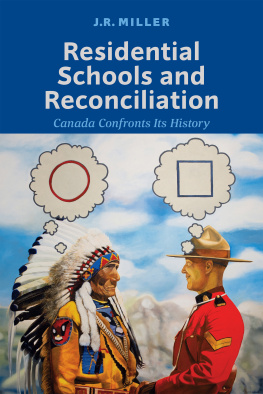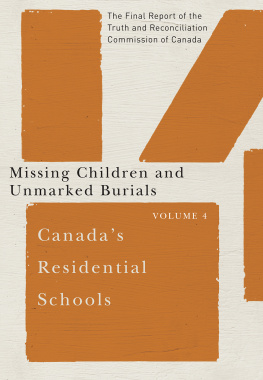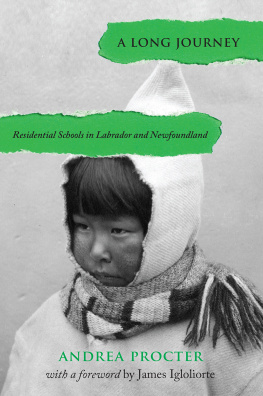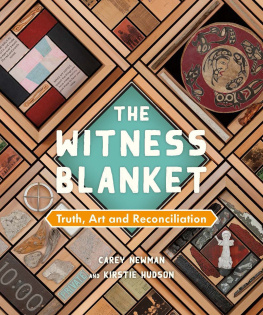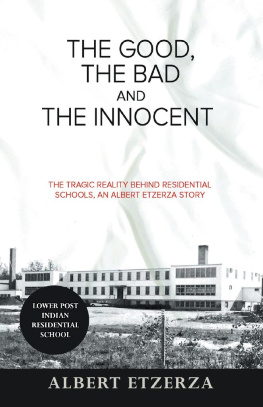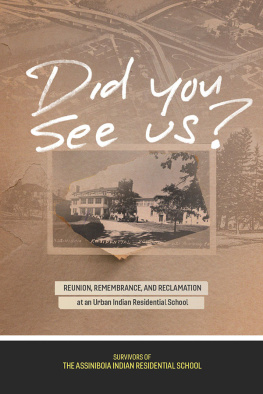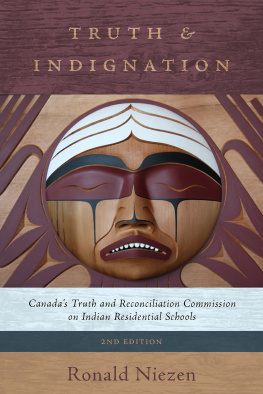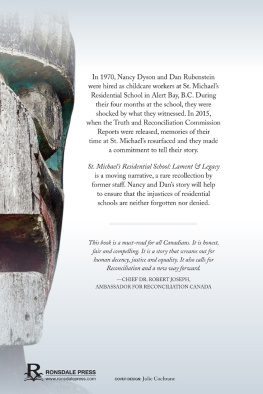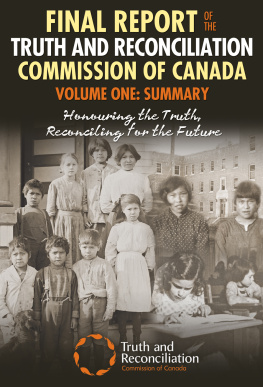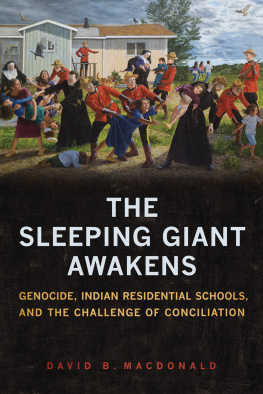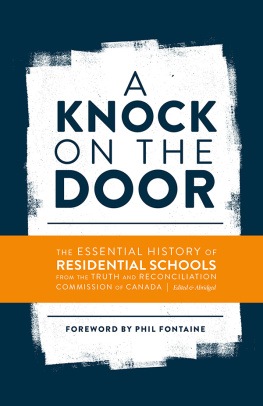J. R. Miller - Residential Schools and Reconciliation: Canada Confronts Its History
Here you can read online J. R. Miller - Residential Schools and Reconciliation: Canada Confronts Its History full text of the book (entire story) in english for free. Download pdf and epub, get meaning, cover and reviews about this ebook. year: 2017, publisher: University of Toronto Press, genre: Politics. Description of the work, (preface) as well as reviews are available. Best literature library LitArk.com created for fans of good reading and offers a wide selection of genres:
Romance novel
Science fiction
Adventure
Detective
Science
History
Home and family
Prose
Art
Politics
Computer
Non-fiction
Religion
Business
Children
Humor
Choose a favorite category and find really read worthwhile books. Enjoy immersion in the world of imagination, feel the emotions of the characters or learn something new for yourself, make an fascinating discovery.
- Book:Residential Schools and Reconciliation: Canada Confronts Its History
- Author:
- Publisher:University of Toronto Press
- Genre:
- Year:2017
- Rating:4 / 5
- Favourites:Add to favourites
- Your mark:
- 80
- 1
- 2
- 3
- 4
- 5
Residential Schools and Reconciliation: Canada Confronts Its History: summary, description and annotation
We offer to read an annotation, description, summary or preface (depends on what the author of the book "Residential Schools and Reconciliation: Canada Confronts Its History" wrote himself). If you haven't found the necessary information about the book — write in the comments, we will try to find it.
Residential Schools and Reconciliation is a unique, timely, and provocative work that tackles and explains the institutional responses to Canadas residential school legacy.
J. R. Miller: author's other books
Who wrote Residential Schools and Reconciliation: Canada Confronts Its History? Find out the surname, the name of the author of the book and a list of all author's works by series.
Residential Schools and Reconciliation: Canada Confronts Its History — read online for free the complete book (whole text) full work
Below is the text of the book, divided by pages. System saving the place of the last page read, allows you to conveniently read the book "Residential Schools and Reconciliation: Canada Confronts Its History" online for free, without having to search again every time where you left off. Put a bookmark, and you can go to the page where you finished reading at any time.
Font size:
Interval:
Bookmark:

Canada Confronts Its History
J.R. Miller
UNIVERSITY OF TORONTO PRESS
Toronto Buffalo London
University of Toronto Press 2017
Toronto Buffalo London
www.utppublishing.com
Printed in Canada
ISBN 978-1-4875-0218-8
 Printed on acid-free, 100% post-consumer recycled paper with vegetable-based inks.
Printed on acid-free, 100% post-consumer recycled paper with vegetable-based inks.
Library and Archives Canada Cataloguing in Publication
Miller, J. R. (James Rodger), 1943, author
Residential schools and reconciliation : Canada confronts its history / J.R. Miller.
Includes bibliographical references and index.
ISBN 978-1-4875-0218-8 (cloth)
1. Native peoples Canada Residential schools. 2. Native peoples Canada History. 3. Truth and Reconciliation Commission of Canada. 4. Truth commissions Canada. 5. Canada Ethnic relations History. I. Title.
E96.5.M53 2018371.82997071C2017-904303-X
University of Toronto Press acknowledges the financial assistance to its publishing program of the Canada Council for the Arts and the Ontario Arts Council, an agency of the Ontario Government.

To Christian
As is usually the case, the preparation of this volume depended on the assistance of many people and institutions. I am grateful to the institutions and programs that have supported the research for this study. The most important of them have been the Canada Research Chairs Program, the Social Sciences and Humanities Research Council (SSHRC), and the Killam Program. Since the late 1990s, I have benefited from a number of awards, formerly called Standard Research Grants, from SSHRC on treaties, reconciliation, and Indigenous policy generally. As well, I have been the beneficiary of a generous grant that accompanied SSHRCs Gold Medal for achievement in research in 2010. From 2001 until I retired in 2014, I also held the Canada Research Chair in Native-Newcomer Relations, a position that greatly facilitated my own research while also conferring the benefit of working with a number of talented graduate students and postdoctoral fellows. And in 2014, I was fortunate to receive the Killam Prize in the Humanities from the Canada Council. This award, too, was accompanied by a money prize. As well, I would be remiss if I did not acknowledge the many ways in which the University of Saskatchewan facilitated and encouraged my research.
As with any historical research, mine has benefited greatly from the hard and effective work of archivists and librarians. Among the latter, I would especially note the professional librarians at the University of Saskatchewans Murray Library. The professional staff of denominational archives the United Church of Canada Archives (Nicole Vonk and staff), the General Synod Archives of the Anglican Church of Canada (Nancy Hurn and Laurel Parson), and the Archives of the Presbyterian Church in Canada (Kim Arnold and Bob Anger) unfailingly were as cheerful and friendly as they were professional and efficient. And until it deteriorated into an environment that was not particularly helpful to individual researchers, I also benefited from the advice and assistance of staff at Library and Archives Canada.
By no means did all the help I received come from institutions and their employees. Jonathan Dewar, formerly with the Aboriginal Healing Foundation and Algoma University, was invaluable in providing advice about illustrations, especially artwork for the cover. Numerous staff associated with the Shingwauk Project at Algoma University were also helpful, as well as welcoming and convivial when I joined them at reunions of the Shingwauk school on numerous occasions. Mike Cachagee, Shirley Horn, Don Jackson, Ed Sadowski, and Krista McCracken were gracious and informative. Donald B. Smith, Professor Emeritus of History of the University of Calgary, was enormously generous with advice about sources and other matters relevant to this project, as he famously has been to so many researchers. The many individuals who generously made time in their schedules to be interviewed at the Shingwauk Project and across the country were critical to my understanding the forces in contention in a series of relatively recent events. The names of most of those informants are listed in the bibliography.
As well, the following people answered queries and/or provided sources for my consideration: Carling Beninger, Leonard Doell, Brian Gable, Meagan Hough, Peter Jull, Julianne Kasmer, Amber Kostuschenko, John F. Leslie, Jennifer Llewellyn, Tom McMahon, Cecilia Morgan, Donna and Jim Sinclair, Sylvia Smith, Kim Stanton, and Angela Wanhalla.
I also wish to thank my editor, Len Husband, managing editor Frances Mundy, and their colleagues at the University of Toronto Press for their careful work on the manuscript.
As well, I would like to thank Adrian Mather, who prepared the index.
Closer to home, Bill Waiser read and provided valuable comments on earlier drafts of many of the chapters, as did my wife and colleague, Lesley Biggs.
Of course, none of these generous people is responsible for any of the errors in the work.
This study is dedicated to my son, Dr Christian A. Miller.
In an effort to provide the reader with some variety in wording, this volume employs a number of terms for the first peoples of Canada. Indigenous, Aboriginal, or Native is used to describe the first peoples as a group. First Nation refers more specifically to those peoples whom the federal government used to term status Indians. Mtis embraces Indigenous peoples of mixed ancestry, whether of partial French, Scottish, or English background.
The terms for the federal government department with constitutional responsibility for First Nations are also varied, although in this case the variety is the result of changes that the government has introduced from time to time. It was known as the Department of Indian Affairs (DIA) from its creation in 1880 until 1936. As part of economies introduced in response to the Great Depression, the department then downgraded to a branch Indian Affairs Branch (IAB) of the Department of Mines and Resources and then, in 1949, of the Department of Citizenship and Immigration. In 1966, the title was changed once more to the Department of Indian Affairs and Northern Development (DIAND), reflecting an emphasis on and interest in economic development on Indigenous lands. DIAND evolved for a time into INAC, Indian and Northern Affairs Canada. In 2011, the government of Stephen Harper altered the name to Aboriginal Affairs and Northern Development Canada (AANDC), recognizing that, for some time, Aboriginal peoples had expressed an aversion to the term Indian. Finally, late in 2015, the new government of Justin Trudeau ushered in the latest formulation, Indigenous and Northern Affairs Canada (INAC).
The need to bring Aboriginal peoples into our national consciousness, to deal fairly and equitably with them, to reconcile them as part of the Canadian mainstream and to deal with their problems, [is] likely the most important public policy issue of the 21st century.
John Crosbie, former Progressive Conservative cabinet minister to editor,
Font size:
Interval:
Bookmark:
Similar books «Residential Schools and Reconciliation: Canada Confronts Its History»
Look at similar books to Residential Schools and Reconciliation: Canada Confronts Its History. We have selected literature similar in name and meaning in the hope of providing readers with more options to find new, interesting, not yet read works.
Discussion, reviews of the book Residential Schools and Reconciliation: Canada Confronts Its History and just readers' own opinions. Leave your comments, write what you think about the work, its meaning or the main characters. Specify what exactly you liked and what you didn't like, and why you think so.

